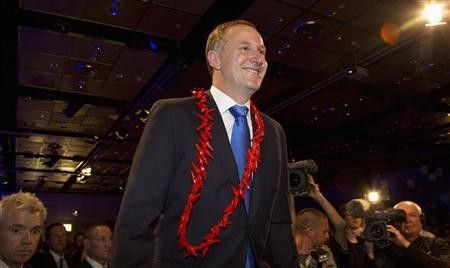New Zealand At G20: Gains Of Trade Boost And Climate Responsibility

The New Zealand Prime Minister John Key has stated that he is very satisfied with the outcome of G20 for his country. On the trade front, New Zealand successfully sealed the FTA deal with South Korea. Also the Summit helped New Zealand to add more clarity to its position with regard to its initiatives on climate change and showed its readiness to add more responsibility to face the climate challenges. According to the PM, New Zealand was also able to make progress in trade deals with the European Union and some Gulf States.
Climate Issue
Climate Change came up as a serious issue in the the G20 meet. President Obama, despite Australian PM Tony Abbott's known aversion to the issue, made it a centre point in his speech, reported TV Nz. Obama added a fresh momentum to Climate Change debate in view of the Paris Climate Summit next year, where countries are supposed to present their post 20/20 emissions targets. New Zealand has committed to provide its target and is working on it.
For New Zealand, it was a big decision given the fact that John Key's National Party had not given climate change its due, with many critics arguing that it was trying to dilute the Emissions Trading Scheme and allowing making emissions rates to rise than making them fall.
Meeting With Putin
Another diplomatic success of John Key was his chance in taking up New Zealand's concerns to Russian president Vladimir Putin, regarding the shooting down of the MH 17 passenger plane over Ukraine. This was done in a "bit of a chat over dinner". The Prime Minister, who was seated alongside the Russian leader brought this up amidst the discussions focussed on pleasantries. Mr Key took a moderate approach and was not aggressive in his language unlike some other leaders who took on Russia. The PM said Russia rejected the argument that officials were denied access to the crash site.
Free Trade
Mr Key also expressed New Zealand's strong advocacy for free trade and to keep it above political tensions. But the PM asserted that it would not exploit Moscow's ban on food imports from other the competitors as an opportunity to encash its strengths.
New Zealand had been working on an FTA with Russia, when the Ukraine crisis engulfed it and the issue went out of their hands. But the EU leaders appreciated the steps that New Zealand had taken as a good international citizen. However, Mr Key wanted a better way on trade affairs management through the offices of the World Trade Organisation. On this, the PM sent out a message an innovative approach can be initiated even if if some countries cannot agree, by allowing a subset of other countries to push it forward.





















